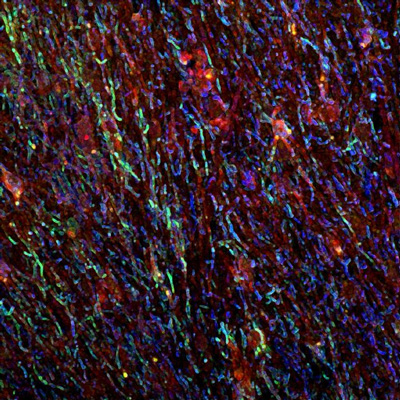Evidence that gut microbes can influence brain inflammation
Posted: 9 May 2016 | Victoria White, Digital Content Producer | No comments yet
New research suggests that gut microbes may remotely influence the activity of cells in the brain that are involved in inflammation and neurodegeneration…


Immunofluorescence imaging of human brain tissue generated from an active lesion from an individual with multiple sclerosis shows astrocytes (blue), the Aryl hydrocarbon receptor (red) and the phosphorylated Signal transducer and activator of transcription 1 (green). CREDIT: Jorge Ivan Alvarez, Assistant Professor at the Department of Pathobiology, School of Veterinary Medicine, University of Pennsylvania, Philadelphia, Pennsylvania, USA
New research suggests that bacteria living in the gut may remotely influence the activity of cells in the brain that are involved in controlling inflammation and neurodegeneration.
Using preclinical models for multiple sclerosis (MS) and samples from MS patients, investigators at Brigham and Women’s Hospital (BWH) found evidence that changes in diet and gut flora may influence astrocytes in the brain, and, consequently, neurodegeneration, pointing to potential therapeutic targets.
“For the first time, we’ve been able to identify that food has some sort of remote control over central nervous system inflammation,” said Francisco Quintana, PhD, an investigator in the Ann Romney Center for Neurologic Diseases at BWH. “What we eat influences the ability of bacteria in our gut to produce small molecules, some of which are capable of traveling all the way to the brain. This opens up an area that’s largely been unknown until now: how the gut controls brain inflammation.”
Dietary tryptophan
Previous investigations have suggested a connection between the gut microbiome and brain inflammation, but how the two are linked and how diet and microbial products influence this connection has remained largely unknown. To explore this connection further, Quintana and colleagues performed genome-wide transcriptional analyses on astrocytes in a mouse model of MS, identifying a molecular pathway involved in inflammation. They found that molecules derived from dietary tryptophan (an amino acid famously found in turkey and other foods) act on this pathway, and that when more of these molecules are present, astrocytes were able to limit brain inflammation. In blood samples from MS patients, the team found decreased levels of these tryptophan-derived molecules.
“Deficits in the gut flora, deficits in the diet or deficits in the ability to uptake these products from the gut flora or transport them from the gut – any of these may lead to deficits that contribute to disease progression,” said Quintana.
The research team plans to investigate this pathway and the role of diet in future studies to determine if the new findings can be translated into targets for therapeutic intervention and biomarkers for diagnosing and detecting the advancement of disease.
Related topics
Microbiome
Related conditions
Multiple Sclerosis, Neurodegenerative diseases
Related organisations
Brigham and Women's Hospital (BWH)



